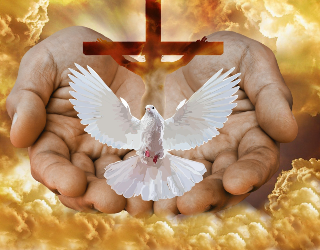Yet you have made him little less than a god;
with glory and honour you crowned him,
gave him power over the works of your hand,
put all things under his feet.
Psalm 8:5 – 6

Yet you have made him little less than a god;
with glory and honour you crowned him,
gave him power over the works of your hand,
put all things under his feet.
Psalm 8:5 – 6

It is a particular obsession of Christians that they need to know the nature of God. Their journey to the Trinitarian doctrine, missing – as we understand it – from the Hebrew and Christian scriptures, emerged in the 4th century in clarifying concerns with the Arius and his followers. The debate flourished until the Council of Florence in 1442, ever since then Christians have attempted to reconnect the doctrine to the daily life of believers.
It is not unreasonable given that God is central to our being Christian, that we should have some idea about who and what s/he is. We preface our moments of prayer with the Trinitarian sign of the cross and are blessed at the end of our worship in the name of the Father, Son and Holy Spirit. But I suspect that a discussion on the Trinity with most Christians would be somewhat brief.
God, both the word and the idea itself are, in fact, human constructions – we use words, images, analogy, metaphor – but they are all we have. Our words cannot encapsulate who or what God is, s/he is beyond our constructions, beyond our ideas and notions. God is God. If we could name his/her nature, would s/he still be God or only the extent of our imagination? Despite this, millions upon millions of words have been written, arguments and counterarguments tendered, excommunications, the church fractured into east and west. Of all Christian doctrines, the Trinity is the one most likely to evade us, and when we can no longer put words to it, we roll out the word ‘mystery’.
The writer of Psalm 8, on the other hand, focuses not on God, but on humanity. It is not how we describe God that is important, but it is the esteem, the glory and honour that God gives us, his creatures, that he would choose us out of all living creatures to rule over his creation. It is about relationship: the unreachable God, the numinous God, the God-whom-we-cannot-adequately-describe, the God beyond our comprehension – in our Christian tradition s/he is accessible and knowable. In our Abrahamic tradition the God who reveals her/himself to Moses at the burning bush is I am who I am. Our tongues and minds will never grasp the fullness of God, but what we grow towards is a sharing in the divinity that is God, for we have been made little less than gods (cf Psalm 8:5).
The Catholic encyclopedia (p. 1270) neatly summarises this complex doctrine: “We are saved by God through Jesus Christ by the power of the Holy Spirit.” This Sunday is Trinity Sunday.
Mr Peter Douglas
Director of Faith and Mission